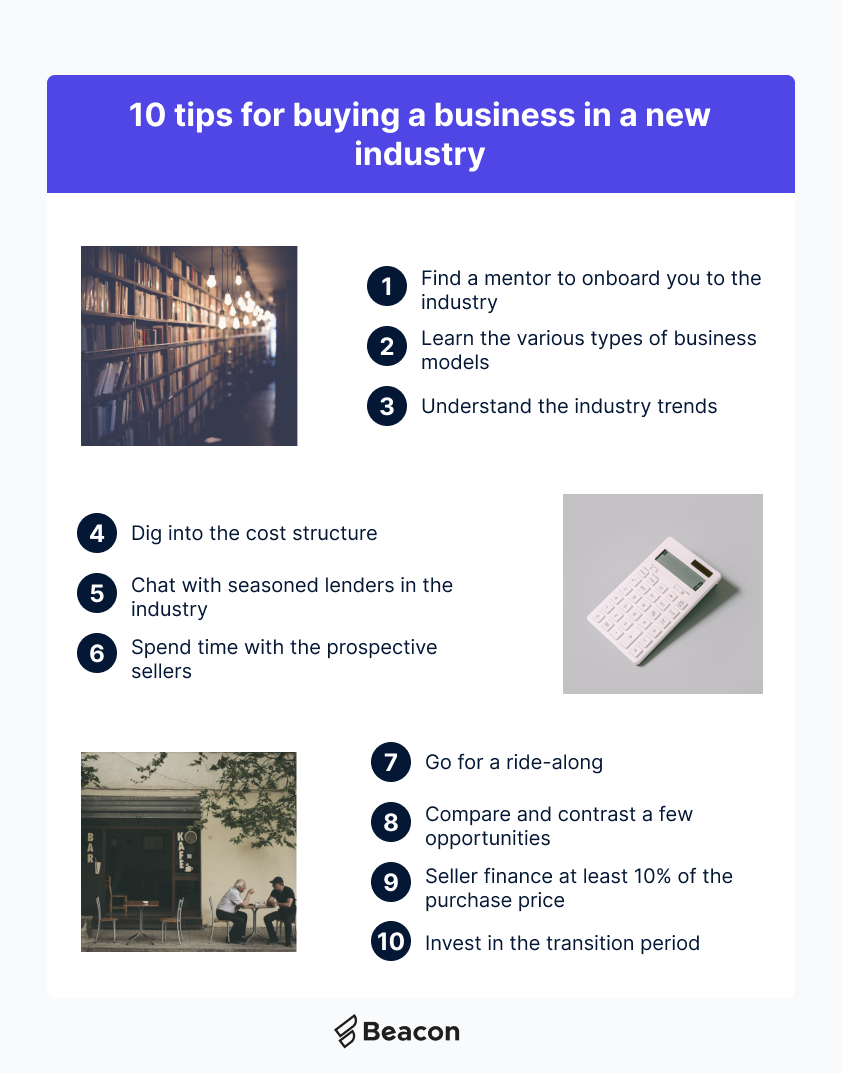Not quite ready to transact?
Subscribe to receive the latest resources for small business deals.
More often than not, the buyers that transact through Beacon are moving into a new industry. They may be leaving the corporate world in pursuit of a more entrepreneurial venture. Or, they may be leaving a job to build wealth through business ownership.
While these buyers are the most common, they often have trouble getting to “yes.” They’re worried they’re going to buy the wrong business, or that they won’t be able to learn the skills needed to be successful in another industry.
What are the common mistakes people make?
When reviewing mistakes that buyers often make when acquiring a business in a new industry, there are a few that come up quite often.
First, buyers do not invest enough in understanding the owner’s roles and responsibilities. Instead, these buyers often spend more time reviewing the financials. More often than not, an ownership transition will fail due to the buyer not being equipped to manage the business, not because the margins were slightly worse than expected.
Second, buyers try to go at it alone. They do not use resources such as industry mentors, seasoned lenders, or the SBDC. In the small business world, there are tons of great resources set up for entrepreneurs. We recommend that buyers use all of them.
Third, buyers underinvest in the transition period. While ensuring that the loan approval process goes smoothly is important, most transition periods have a 30-day time limit. A buyer’s goal should be to make that period as structured and useful as possible. At Beacon, we help facilitate these periods by reusing playbooks across businesses in similar industries.
Here are 10 tips for buying a business in a new industry

1. Find a mentor to onboard you to the industry The best tip for buying an existing business in a new industry is to find a veteran entrepreneur who can serve as a coach or advisor. If this entrepreneur has been in the industry for at least a decade, he or she will likely know the red flags as well as the strong signals of a great business.
2. Learn the various types of business models No two businesses are identical. Similarly, in most industries there are a variety of business models and specializations. Learning the types of businesses within an industry will serve buyers for identifying the types that will be the best fit given their preferences and skills. Ask your mentor about the models he or she has encountered in the industry or “mystery shop” similar businesses yourself.
3. Understand the industry trends Some industries are contracting, while others are growing. Some business models are becoming less common than others. Some specialities are blowing up in certain regions of the states. Labor shortage may be the number one risk in a few industries, while the supply chain or a recession may be the biggest in another. Knowing the industry trends will help you evaluate businesses and know which ones are set to grow.
4. Dig into the cost structure Before you can review the financials of a business, you need to know the basic cost structure and revenue models. You cannot evaluate anything without knowing the difference between “good” and “bad.” Some industries have really high COGS, as labor and supplies make up most of the cost structure. Other industries may have really high capital expenditure as the equipment needed is expensive.
5. Chat with a lender There’s no better partner for a business buyer than a lender who’s looked at countless financial statements in an industry and can spot the “do’s” and “don’ts” that come with acquiring a business. At Beacon, we have a number of lending partners who are happy to chat with you.
6. Spend time with the owners Once you’ve gotten a lay of the land from industry veterans and lenders, the next best approach is to spend time with the owners you’re chatting with. While many buyers may do a single shop tour before submitting an offer, others may want to spend a few hours with the owner across multiple meetings. This approach goes a long way insofar as getting buyers up-to-speed with the industry and building a relationship for advice and mentorship after the acquisition.
7. Go for a ride-along Aside from spending time with the owners in an office or a restaurant, ask the owner to take you for a ride-along. During this time, you can ask to visit a few job sites, tour the factory, or watch the store during normal hours. They may ask for you to have a simple alibi, so as not to spook the employees or customers, but if they believe you’re genuine and serious, they’ll likely say yes.
8. Compare and contrast We find that the best buyers review at least three opportunities within an industry. This gives them a chance to get comfortable reviewing the financials during due diligence, chatting with owners, and understanding the pros and cons with different opportunities.
9. Include at least 10% of seller financing When it comes to submitting an offer, at Beacon we ensure our small business owners are open to seller financing at least 10% of the transaction. We recommend that you ask for at least 10% seller financing. This ensures that the owner has enough skin-in-the-game to help you get off to the races.
10. Invest in the transition period All Beacon listings include a 30-day complimentary transition period by the owner. We cannot recommend investing in this transition period enough. Buyers who hit the ground running the fastest are those who created a structured transition plan to learn the ins and outs of the business.
Not quite ready to transact?
Subscribe to receive the latest resources for small business deals.

If you're interested in acquiring a Main Street business, Katie is your go-to person. Katie hails from Kansas City originally and majored in Art History at the University of Kansas. In her free time, she enjoys climbing, paddleboarding, and cooking.
Information posted on this page is not intended to be, and should not be construed as tax, legal, investment or accounting advice. You should consult your own tax, legal, investment and accounting advisors before engaging in any transaction.

Calder Capital

Sam Domino


